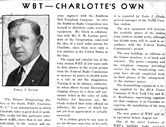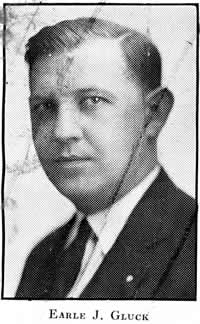


![]()
![]()
"The Pioneer Broadcasting Station of the South, WBT, Charlotte, N. C." is an announcement in which Charlotte takes a great deal of pride. The credit for this particular statement is due, more than to any other individual, to the earnest and unflagging efforts and interest of Earle J. Gluck, general manager of Radio Station WBT.
 Mr. Gluck was born and reared in Baltimore where he attended the Polytechnic Institute and Johns Hopkins University. When only a lad of twelve, he became so interested in anything pertaining to wireless that he became an amateur experimenter with a spark transmitter at an age when most boys are chiefly interested in marbles. Attaining a marked degree of proficiency in the study, he spent two summer vacations at the age of 15 and 16 as a wireless operator in the Merchant Marine. Entering the Navy during the war, he served from April 26, 1917 to September 12, 1919, as wireless operator on a sub chaser, transports and other naval ships during that time.
Mr. Gluck was born and reared in Baltimore where he attended the Polytechnic Institute and Johns Hopkins University. When only a lad of twelve, he became so interested in anything pertaining to wireless that he became an amateur experimenter with a spark transmitter at an age when most boys are chiefly interested in marbles. Attaining a marked degree of proficiency in the study, he spent two summer vacations at the age of 15 and 16 as a wireless operator in the Merchant Marine. Entering the Navy during the war, he served from April 26, 1917 to September 12, 1919, as wireless operator on a sub chaser, transports and other naval ships during that time.
Obtaining his release from the Navy at the conclusion of marine wartime activities, he arrived in Charlotte in the fall of 1919 to be come engineer with the Southern Bell Telephone Company. In 1921 the Southern Radio Corporation was formed to distribute radio receiving equipment. Mr. Gluck in collaboration with Mr. F. M. Laxton, president of the Corporation, conceived the idea of a local radio station for Charlotte, since there were only a few stations in the United States at the time.
The rapid and colorful rise of the baby station WBT of 250 watts with its first charter to the recent permit from the Federal Radio Commission to increase its power to 25,000 watts is a tale to stir the imagination. Nursing it in its infancy, enthusiastic when others became discouraged, clinging always to a deep and passionate belief in the value of radio facilities for American use, Mr. Gluck realized that radio offered an influence, the power of which has not yet been appreciated or actually measured.
It is seldom given to any man to see his dreams come true in his early thirties but with the installation this month of the new equipment which will increase the available power of Station WBT from 5,000 to 10,000 watts, it seems that Mr. Gluck will have this unique experience. Although the station only has permission to use 25,000 watts at present, it is hoped that it is only a question of time until WBT's 50,000 watts will equal the present power of any radio station in this country.
Quiet and modest in bearing, pleasing in personality, yet dignified as becoming an executive, Mr. Gluck has attained an enviable position in radio and engineering circles in the United States.
« prev Story 1 of 4 next »